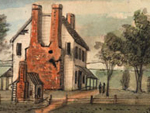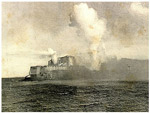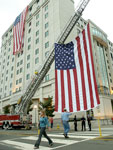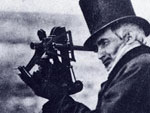Japanese American Internment: Ansel Adams Photos
Video 1: Picture of Ansel Adams: Grainey, Ed. "Ansel Adams." Portrait File of the Bancroft Library, University of California, Berkeley. All others: Adams, Ansel. Photographs of Manzanar War Relocation Center, 1943. Library of Congress, Prints and Photographs Division. Video 2: Adams, Ansel. Photographs of Manzanar War Relocation Center, 1943. Library of Congress, Prints and Photographs Division. Video 3: Images from the following institutions: The Densho Project. Smithsonian Institution. A More Perfect Union: Japanese Americans and the U.S. Constitution. Adams, Ansel. Photographs of Manzanar War Relocation Center, 1943. Library of Congress, Prints and Photographs Division. National Archives and Records Administration. Archival Research Catalog. Video 4: Images from the following institutions: National Archives and Records Administration. Archival Research Catalog. Smithsonian Institution. A More Perfect Union: Japanese Americans and the U.S. Constitution. National Archives and Records Administration. Ronald Reagan Presidential Library.
Ansel Adams's photographs of the World War II-era Manzanar internment camp capture the emotional impact of living in internment. Frank Wu describes how he uses these photos to jump-start conversations with students about community, responsibility, loyalty, and identity in the face of prejudice.
The famed photographer Ansel Adams was a friend of the director who ran the Manzanar camp, one of 10 internment camps. Ansel Adams asked if he could come visit the camp to shoot some photos. At the time the War Relocation Authority, the federal government agency that was in charge of the camps, actually had an extensive project to document what life was like.
But Ansel Adams just wanted to take his own photos, so he came out to Manzanar—which was an isolated place of stark beauty at the foot of the Sierra Nevadas—and shot a series of beautiful black and white photos. These photos captured not just the majesty of the natural landscape, but the effort of Japanese Americans to recreate a sense of community, some semblance of normal life with schools, and newspapers, a bank and post office, and so on. To try to bring the sense for their families, for their children, that life would go on even behind barbed wire, under gun towers, and the watchful eye of soldiers.
Ansel Adams—because he was such a great photographer—was able to document some aspects of the internment that the government didn't want to have shown. They didn't want the barbed wire, and the guard towers, and the armed soldiers to be depicted, so they told Adams that he couldn't photograph those subjects directly. So what did he do? Well, he was very clever. He captured them in the background, in shadows. In some of the photos when you look you can see just faintly that he's taking a photo of something, but in front of the photo you can see barbed wire, or on the ground you can see the shadow of barbed wire. Some of the photos even show the blurry outline of a soldier's shadow. Then for the gun towers, because he wasn't allowed to take photographs of them, he climbed on top of them and shot photographs looking down. That allows the viewer to infer that there must be some sort of very tall structure that you could climb up on top of to shoot the photos.
What Adams wanted to do was show everything about the camps, both the sense that the camps were a place of confinement, loss of liberty, dignity, equality; yet coupled to that the sense that here were people struggling under the circumstances to do the best that they could.
The Manzanar camp [was] hastily built with the quality of army barracks. These were just wood plans and tar-paper ceilings and the wind, fierce wind of the desert winters, would blow through the cracks in these buildings and this was chilling. Dust storms would arise in the summer and the temperature would climb well into the 100s. This was a place of hardship, a place where the photographs—because Adams had such artistry—it gives you a sense of beauty, but if you look closely at it you can also understand what it must have been like to be confined. To have just a 20-by-20 room for an entire family, sometimes two families packed in there together, with just a stove for heat with nothing that would help alleviate the brutal summers. A sense of what it was like to have just life inside a confined space. Inside these barracks where people suffered from tremendous doubt, they didn't know what would happen. All of their possessions had been taken away from them, their bank accounts frozen, they had been put on trains and buses with the windows blacked out so people wouldn't know who was being led away.
They weren't told what would happen to them as the war went on for months and then eventually years. Even though it became apparent that the United States would likely—ultimately—prevail, for these individuals, about 125,000 of them—two thirds of them native-born citizens of this country—almost all of them of Japanese descent. Would they be welcomed back into the hometowns from whence they had come? Because there had been such hostility, even before the war, people who wanted to drive them out. Who said openly—in a way that would surprise us today—"California was for white men, for Christians only." Even though of course many of the Japanese Americans were very much assimilated—they loved baseball, they loved Hollywood movies, and they were indeed Christians—there were many who wanted to exclude them. That's why there were alien land laws that forbade the first generation (those who had come) from owning land. That's why there were naturalization laws that said if you were not a free, white person you could never become a citizen, an equal, a real member of this nation. That's why there were laws about interracial marriage so that people who were of Japanese descent couldn't marry people who were white. There were numerous other legal restrictions on their ability to obtain licenses, to fish or to practice any type of profession, all up and down the west coast.
So there was tremendous uncertainty. Even though they tried as best as they could to establish a sense of community and normal life, they wondered what beyond the barbed wire was left for them. If the neighbors, the people whom they had called friends before the bombing of Pearl Harbor, would take them back, would accept them as equals.
This photograph shows the isolation of the camp. When the government said they would build internment camps, many politicians who wanted to be rid of Japanese Americans objected, and said they didn't want the camps located where they were. So the camps were all sited in desolate areas, places where there really weren't very many people—in the desert, in swamps, places where people didn't want to live.
Manzanar was one example. You can see it looks beautiful with the mountains in the background, but that beauty comes with a harshness, a tough physical environment. The closest towns to Manzanar, Bishop and Lone Pine, were dwarfed by Manzanar. When Manzanar opened up it was much larger than any of the little tiny towns nearby. That was true of many of the camps because the effort was made to locate Japanese Americans as far away as possible. When the camps opened up they transformed the local economy, for once people were able to find jobs by working in the camps—if they weren't of Japanese background.
When you look at this photo, you also see barracks, the housing that was built. This was built by the Army in some instances; sometimes by volunteers, people who were themselves Japanese Americans—usually men—who went before the families came and helped to build these structures that you see with thin wood walls and tar-paper roofs. These structures where families would be all cramped together, where they would be issued numbers and identified in that way, and then they would have a specific block that they would live on. Everything was very orderly, because this was originally run by the Army, it was a military effort that was eventually transferred to a civilian government agency. Never before had the U.S. government tried to confine this many people on a mass basis because of race and ethnicity. When you look at the orderly rows here you can get a sense of the confinement, a sense that this was a project undertaken by the government, the sort of thing where people were made to live there. As beautiful as the background is, this isn't the sort of place that anyone would volunteer to move, losing everything that they had. These photos capture for us a sense of the environment on the one hand, and the loss of liberty on the other hand.
This photograph is a wonderful, poignant photograph that captures for us how assimilated Japanese Americans were. These were folks who had embraced baseball and apple pie. Before Pearl Harbor there was an all-Nisei league in Southern California; Nisei is the Japanese term for "second generation." These were boys whose mothers sewed baseball uniforms for them out of burlap sacks or whatever they could find because they were of modest means. Or in some instances, if they were lucky, maybe a local hardware store or Baptist church would sponsor them and their uniforms might be a little fancier. They embraced baseball—a great American game—that really captures the spirit of what this nation is about with its teamwork, with its sense of celebrating, and being outdoors. With people of all backgrounds, baseball was the sport that brought people together. They would listen to broadcast on the radio, on the old Philco, the family might gather around and listen to a ballgame.
Well, this photograph shows Japanese Americans in the camps enjoying baseball. Not only did they gather in large crowds to watch the youngsters play, but in some instances they were even allowed to travel from camp to camp. Sometimes the baseball diamond would be built out away from the camp past the barbed wire and armed guards. You might wonder, "Why, if people were being locked up, would you let them out in that way?" Well, in part it shows the amount of trust. Japanese Americans were so assimilated that they reported to the camps as a group without protest; 125,000 people—two thirds of them citizens of this nation—loyal to this nation. There was not a single instance before the camps, during, or after of espionage, sabotage, treason, or any sort of conduct that would cause anyone to think—other than race and ethnicity—that this was a group that would ever present any risks or problems.
So once they were in the camps, the folks who ran the camps realized, well, it's perfectly safe to let Japanese Americans travel from camp to camp to play baseball, that would help maintain order. Plus, if you thought about it, if anyone tried to escape, where would they go? These camps were built in the desert or in swamps; places where there really weren't cities nearby, there were scarcely even towns. So if a lone Japanese American outfielder suddenly decided he'd had enough, and took off, he'd have to walk for days before he reached anything at all, and even then he would be quickly spotted as obviously different.
So it was that baseball thrived inside the internment camps. This photograph captures in a wonderful way how—even though they had been locked up by their own government, even though they'd lost liberty, equality, and dignity—Japanese Americans still embraced the great American pastime. Still came out to cheer in large numbers they watched, as they tried to enjoy what they could of the life they recreated.
The internment of Japanese Americans is so well documented—it's wonderful. You can go back and look at primary sources that are just text that are the laws themselves, that are the cases—the Supreme Court did consider, not one or two or three, but four major cases that remain important precedent to this day. Those are a part of the legal background to this story.
But in addition, there's been a wonderful effort to collect oral histories; through the Densho Project and others, much of which is available online. You can hear from folks who are in their 60s, 70s, 80s, even older who will recall their memories from the time when they were—in some instances just children—but in other instances teenagers and already grown up; as they recount the stories of life before Pearl Harbor, during the camps, and of how after the war was over and the normalcy of the 1950s was upon us, how they attempted to put together the pieces. This gives you a sense—first hand from the people who were there—what it was like.
You can also take a look at the many artifacts that have been preserved. There are art exhibits now of what people made. Arts and crafts projects where they took cast-off bits of wood, where they took debris, and carefully, painstakingly carved small toys and jewelry and other objects that they gave to family and friends within the camp.
Because these camps involved so many people—they involved children, the elderly, entire families—this was the relocation and confinement of an entire community. It was very different and it gave people an opportunity, even as they were behind the barbed wire, and under the gun towers and the watchful eye of soldiers, to try to put together life. A different life, to be sure, but to put together a life that had a sense of community and belonging. There are many objects now that testament to what that life was like.
There also are objects that have been saved that were part of the internment itself. Washboards, for example, that women used when they were doing laundry. When they didn't have washing machines or dryers, they had a single day of the week dedicated to laundry, where all the women would go out and in a communal manner do the laundry; and that's painstaking, backbreaking work that most of us don't know today. But they had washboards, old-fashioned washboards, and steel tubs that they had to use. There are museum exhibits where you can see these objects, where they’ve been preserved, where they actually have tried to recreate the barracks or one of the rooms that they had.
All of this helps to give people a sense of what it was really like. These primary sources are so rich in their detail and in what they convey—the meaning that is packed in there, that even the best secondary source—the best nonfiction books that have been written, or fiction even, about the internment camps—those can't come close to capturing for us what a primary source can show us, what it can teach us. Even so, we need to have the background and context. When you're just looking at an object, at a washboard or basin, well, you might not even know what that is. So it has to be explained, it has to be situated within the sense of life as it was lived then.
That's why it's important for historians to do the work that they do. So the secondary sources compliment the primary sources. They help us by giving us the interpretive framework. Because if all we're doing is just looking at objects, and we don't understand what those objects were for, how they fit in to the day-to-day lives of the people who owned and used them, then we've really missed out on an important part of the story.
When I've taught the internment, what I've done is I've asked students to imagine. With high school students it's perfect, because they're just the age that so many who went to the camps were. High school students. And when I ask them to imagine—there's a specific decision that young men had to make—and to a lesser extent young women too. That decision came when Franklin Delano Roosevelt, the president, decided that he would reinstitute the military draft.
Now there were many Japanese Americans serving in the United States Armed Forces when Pearl Harbor took place. Almost all of them were immediately discharged because they were regarded—even if they were native born—as enemy aliens, and they were all reclassified. Not only that, anyone who was a young man who was of draft-eligible age who otherwise would have been put in the Army, they too were kept out. But after it became apparent that the camps—well, it was creating a public relations problem, FDR decided—especially given how loyal the Japanese Americans had already proved themselves, he decided that he would restart the draft. He would say if you’re Japanese American and you're of the age that you would normally go into the Army or the Navy, that we will continue to require you to do that. He actually made a statement about how loyalty is a matter of the heart, not of race.
So when I teach this, what I do is I ask young men and women, "If you were 17 or 18, and you knew that you would be drafted, what would you do? Would you on the one hand serve voluntarily—in a segregated unit?” Because remember back then the U.S. Army had specific units based on race; there were African American units and white units and it was clear which units were the more favored. The African American units had white officers, and the same thing was done for this group. There were Japanese American units—the 42nd and the 100th. Over time, by the way, they became the most highly decorated U.S. military units in history. So these soldiers prove, through the most profound sacrifice you could make of life and limb, that they indeed were loyal to this nation.
What I do is I ask the students—who are almost exactly the same age as the real people who faced this choice then—what would you do? Would you go off to war? Would you fight Hitler? Would you risk the possibility that you would be killed wearing the uniform of a soldier who looked just like those who were guarding your family, your parents, your cousins, everyone that you had known? Would you fight for a flag that did not fly for you?
Or, would you be a draft resister. Would you answer the loyalty questions that were put to you? Because everyone in the camp was asked to answer an enormous series of questions about whether you were loyal to the United States, whether you liked Japanese culture, whether you had promised to fight for the United States if asked to do so, and so on. Would you answer those questions no and no, there were two specific questions that were about loyalty, and face the possibility that you would be prosecuted. In ever instance, those who had lost were sent to the federal penitentiary, where they served with murderers and bank robbers at places like Leavenworth, and they emerged with criminal records. Which choice would you make?
Now as it happens, overwhelmingly Japanese Americans faced with this choice chose to respond by fighting—they volunteered, they served, they became decorated military heroes. And not just the men, but women too, they served in the WACs and the WAVES. Outside each camp, the Japanese American Citizens League erected an honor roll—a big board—where they had on pieces of wood the names of everyone who was in the U.S. Armed Forces. They put it up on this honor roll so that they could see who was defending their nation, meaning of course the United States.
That was the choice almost everyone made. But a handful became draft resisters as well. The decisions that the young men made then, those were life-changing decisions. Those were decisions that defined not just who they would be as young men, but who they would be for the course of their lives. All the way until the time that the United States, in 1988, decided to apologize for all of this. They passed a law, the Civil Liberties Act, that paid reparations to those in the camps. The young men—sometimes would be cousins, maybe even brothers, who had made very different choices—some of them had stopped speaking with each other; because the one went off to fight, and the other became a draft resister. This reflected such different—radically different philosophies of how they viewed themselves, how they viewed their country, how they viewed rights and responsibilities. That break was just too much.
I’ve always found that that’s a good way for people to think about this. To ask, what would it be like if I were there? If I were of Japanese descent? If I loved baseball and spoke English and was assimilated in every way and together with my family was rounded up and locked away. If I lost everything—would I, nonetheless, continue to embrace my nation, or would I become embittered? That framing allows us to think through all of these issues the way that the best history is done. By asking what would it be like for us now, today, under very different circumstances—material and in every way with the changes of technology. But, we’re still human. How would we—if we were part of the community then that faced these challenges, how would we have responded?




